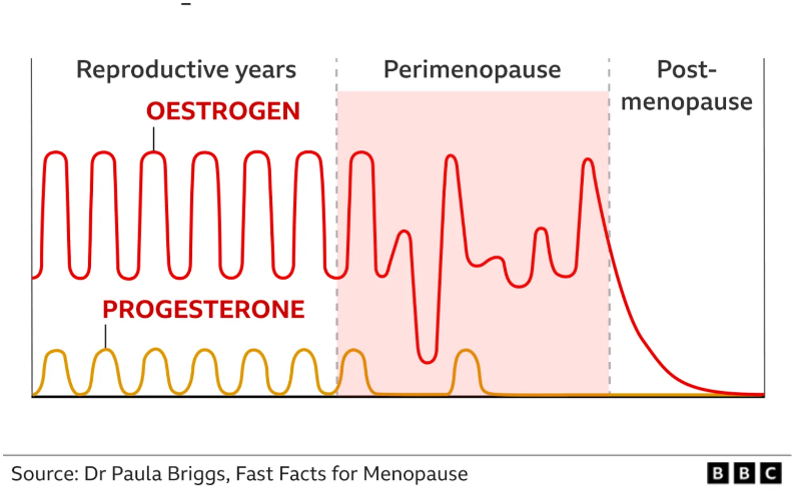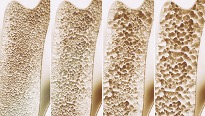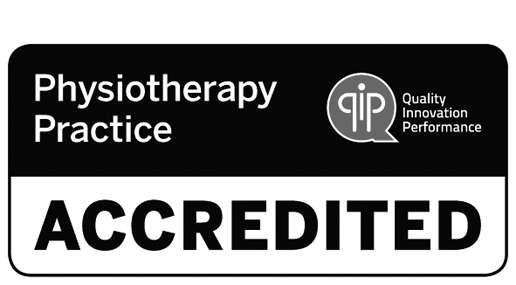
Menopause Matters!
It's so much more than hot flushes, night sweats & brain fog.
We see many peri and post-menopausal women experiencing bladder problems and painful sex, but there are many more bothersome symptoms. Kath Tsebelis is a Physiotherapist, Pilates & Fitness instructor, Nutritionist and Certified Menopause Coach. She has over 34 years of clinical experience and is the Director of Vibrant Femmes an organisation dedicated to empowering women to live healthier, stronger and longer lives. Kath recently ran a menopause workshop at our rooms, attended by 3 of the WMHP team. We found it to be a wonderful “one-stop shop” for all things menopause and left with new knowledge and practical tips. This inspired us to ask Kath to share some of her menopause wisdom and a little about her workshop. SO - Let’s talk about menopause!
What exactly is Menopause?
 It’s actually a date on the calendar exactly 12 months after your last period. It is defined as the time when a woman's ovaries stop producing hormones and menstrual periods cease. The average age of natural menopause is 51, but between 45-55 is considered “normal”. Everything after that date is technically “post-menopause”. Perimenopause is the stage leading up until your final period. It’s usually between the ages of 45-55 years old. It lasts 4-6 years for most, as little as 1 year for some or as long as 10 for others, the average being 7 years. So, doing the math…women as young as 35 can enter perimenopause. The ovaries gradually slow down over time as they begin to run out of eggs. This period of time is hormonal chaos! It’s when most of the characteristic symptoms manifest; the hot flushes, night sweats, brain fog and mood swings, just to name a few! A common feature of perimenopause is irregular periods; less or more often, longer or shorter with bleeding lighter or heavier than usual.
It’s actually a date on the calendar exactly 12 months after your last period. It is defined as the time when a woman's ovaries stop producing hormones and menstrual periods cease. The average age of natural menopause is 51, but between 45-55 is considered “normal”. Everything after that date is technically “post-menopause”. Perimenopause is the stage leading up until your final period. It’s usually between the ages of 45-55 years old. It lasts 4-6 years for most, as little as 1 year for some or as long as 10 for others, the average being 7 years. So, doing the math…women as young as 35 can enter perimenopause. The ovaries gradually slow down over time as they begin to run out of eggs. This period of time is hormonal chaos! It’s when most of the characteristic symptoms manifest; the hot flushes, night sweats, brain fog and mood swings, just to name a few! A common feature of perimenopause is irregular periods; less or more often, longer or shorter with bleeding lighter or heavier than usual.The Menopause Transition
 The graph here depicts the hormonal fluctuations in the pre, peri and post menopause phases of a woman’s life. The regular cyclical fashion of the hormones in the reproductive years i.e. regular menstrual cycles, followed by the rollercoaster pattern in perimenopause and then the dip and flat nature of hormones post menopause.
The graph here depicts the hormonal fluctuations in the pre, peri and post menopause phases of a woman’s life. The regular cyclical fashion of the hormones in the reproductive years i.e. regular menstrual cycles, followed by the rollercoaster pattern in perimenopause and then the dip and flat nature of hormones post menopause. However, it’s not just about those horrid hot flushes and dreadful night sweats… the drop in our hormones, primarily Oestrogen, Progesterone and even Testosterone (yes, women have this “male” hormone too!) that starts in our mid-30s can lead to serious health issues. Every organ and tissue in our body has receptors for these hormones so when the levels fall it means they can’t function properly. Issues include heart disease, cognitive decline such as Alzheimer’s and dementia, brittle bones, extra belly fat, less muscle tissue, and a host of other medical illnesses.
It's What’s Inside That Counts
 In Australia, heart disease is our number one killer, taking a woman's life every hour, of every day, with Alzheimer’s and Dementia close behind! Heart disease risk significantly increases after menopause when protective oestrogen levels plummet, triggering a cascade of cardiovascular changes: blood vessels become less flexible, cholesterol profiles worsen (higher LDL, lower HDL), blood pressure rises, abdominal fat increases and inflammation accelerates. This hormonal shift explains why pre-menopausal women enjoy lower heart disease rates than men, but post-menopause, their risk equals or exceeds men's—a critical health transition that deserves greater awareness. Compounding the risk is the fact that symptoms of heart disease in female are very different to those of males, often unrecognised, leading to reduced medical visits for help.
In Australia, heart disease is our number one killer, taking a woman's life every hour, of every day, with Alzheimer’s and Dementia close behind! Heart disease risk significantly increases after menopause when protective oestrogen levels plummet, triggering a cascade of cardiovascular changes: blood vessels become less flexible, cholesterol profiles worsen (higher LDL, lower HDL), blood pressure rises, abdominal fat increases and inflammation accelerates. This hormonal shift explains why pre-menopausal women enjoy lower heart disease rates than men, but post-menopause, their risk equals or exceeds men's—a critical health transition that deserves greater awareness. Compounding the risk is the fact that symptoms of heart disease in female are very different to those of males, often unrecognised, leading to reduced medical visits for help.The Bare Bones Of The Matter
 Loss of bone density is another huge deal. One in four women over 50 will be diagnosed with osteoporosis, increasing the risk of a fracture with one in two Australian women fracturing a bone. Up to 25% of those who fracture their hip die within the first year (that’s 3000 deaths per year). On the right is a picture of a bone that has progressively lost its healthy structure as evidenced by the larger more open honeycomb structure. This makes it more brittle and prone to fracture.
Loss of bone density is another huge deal. One in four women over 50 will be diagnosed with osteoporosis, increasing the risk of a fracture with one in two Australian women fracturing a bone. Up to 25% of those who fracture their hip die within the first year (that’s 3000 deaths per year). On the right is a picture of a bone that has progressively lost its healthy structure as evidenced by the larger more open honeycomb structure. This makes it more brittle and prone to fracture.The Four Fundamental Pillars of Menopause Health
From the mid-30s onward, our hormones go on a rollercoaster ride. We start losing bone and muscle and our bodies have new requirements. The sneaky and concerning part is that heart disease, bone loss and cognitive decline are all silent diseases. You might not know you even suffer from them until you break a bone, have a heart attack or start forgetting important things.
During this time, our diet needs to shift, our workouts need a makeover and we need to pay more attention to essentials like sleep and stress. In her Vibrant Femmes workshops, Kath Tsebelis does a deep dive into the four fundamental pillars of menopause health and you can get all your questions answered. Here is an overview of what is explored in the workshop or 1:1 coaching.
Pillar #1 Hormones:
- Hormones are very protective of health, learn why their decline should be taken seriously.
- Effects of hormonal changes on every body system, understand how to balance them and identify patterns and triggers.
- What questions you should be asking your GP regarding menopause hormonal therapy
Pillar #2 Nutrition:
- Discover the best foods to eat for building muscle and decreasing fat
- Learn tips on prioritising protein at every meal to preserve muscle mass
- Understand what foods are calcium and vitamin D-rich to optimise bone health
Pillar #3 Exercise:
- Short movement segments, including Pilates, Strength, Yoga, and Breathwork/Meditation and required equipment are included in the workshop - tailored to all age and fitness levels.
- Guidance and motivation to keep the groove going at home through free YouTube links to the exercise programs.
- Learn about the exercise types, optimal dosage and how to easily and safely incorporate exercise to keep you fit and build muscle and bone.
Pillar #4 Lifestyle Habits:
- Understand the benefits of sleep and tips on improving yours
- How does alcohol impact your body during menopause?
- Practice stress-reduction techniques such as meditation and deep breathing
Vibrant Femmes Menopause Workshops
 Join Kath Tsebelis and other women experiencing similar problems and get the lowdown on staying fab and healthy! These workshops are packed with evidence-based information to help you prevent diseases as well as simple strategies that can reverse issues if they're already affecting your life.
Join Kath Tsebelis and other women experiencing similar problems and get the lowdown on staying fab and healthy! These workshops are packed with evidence-based information to help you prevent diseases as well as simple strategies that can reverse issues if they're already affecting your life. Delicious and nutritious morning tea and lunch is included. Everyone walks away with a gift bag filled with goodies related to the Vibrant Femmes four pillars. Participants leave feeling like they can conquer the world, or at least their health! Empowered, inspired, and motivated to make simple, healthy changes in their lives. Check out their testimonials! Come join the Vibrant Femmes revolution!
The next workshop is Sunday May 25th 2025
Women’s & Men’s Health Physiotherapy, 524 Burke Road, Camberwell.
Booking link: https://www.vibrantfemmes.com.au/event-list
or via the QR code. Spaces are limited so get in quickly!




